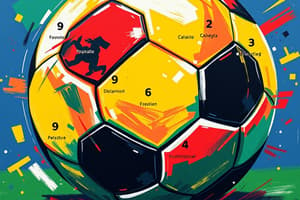Podcast
Questions and Answers
What is the main objective of football?
What is the main objective of football?
- To control possession of the ball
- To score goals by getting the ball into the opposing team's net (correct)
- To complete the game within 90 minutes
- To defend the team's own net
What team formation is commonly referenced as 4-4-2?
What team formation is commonly referenced as 4-4-2?
- Four defenders, two midfielders, four forwards
- Two defenders, four midfielders, four forwards
- Four defenders, four midfielders, two forwards (correct)
- Three defenders, four midfielders, three forwards
Which of the following positions is primarily responsible for scoring goals?
Which of the following positions is primarily responsible for scoring goals?
- Midfielder
- Defender
- Forward (correct)
- Goalkeeper
What duration is a standard football match?
What duration is a standard football match?
What does the offside rule prevent?
What does the offside rule prevent?
When did the first World Cup take place?
When did the first World Cup take place?
Which governing body oversees international football?
Which governing body oversees international football?
What is a common method for preventing the opposing team from scoring?
What is a common method for preventing the opposing team from scoring?
Flashcards are hidden until you start studying
Study Notes
Overview of Football
- Team sport played between two teams of eleven players.
- Objective: Score goals by getting the ball into the opposing team's net.
- Played on a rectangular field with a goal at each end.
History
- Originated in England in the 19th century.
- Became globally popular; FIFA was founded in 1904.
- The first World Cup was held in 1930.
Basic Rules
- Match duration: 90 minutes, divided into two halves of 45 minutes each.
- Offside rule: Prevents attacking players from gaining an unfair advantage.
- Fouls: Includes tripping, pushing, and holding, can result in free kicks or penalties.
Positions
- Goalkeeper: Last line of defense, prevents goals.
- Defenders: Protect the goal, typically include center-backs and full-backs.
- Midfielders: Link between defense and attack, control the game's tempo.
- Forwards: Primary attackers, responsible for scoring goals.
Competitions
- Domestic leagues (e.g., Premier League, La Liga, Serie A).
- National cups (e.g., FA Cup, Copa del Rey).
- International tournaments (e.g., FIFA World Cup, UEFA Champions League).
Major Skills
- Dribbling: Maneuvering the ball while running.
- Passing: Distributing the ball to teammates.
- Shooting: Kicking the ball towards the goal.
- Defending: Preventing the opposing team from scoring.
Tactics and Strategies
- Formation: Arrangement of players on the field (e.g., 4-4-2, 4-3-3).
- Pressing: Forcing the opposing team to make mistakes.
- Counter-attacking: Quick transitions from defense to attack.
Governing Bodies
- FIFA: International governing body for football.
- UEFA: Governing body for European football.
- National associations, such as the FA (Football Association) in England.
Player Development
- Youth academies: Programs that train young players.
- Scouting: Identifying and recruiting talented players.
Global Impact
- Football culture: Significant influence on social and cultural aspects in various countries.
- Economic impact: Major source of revenue through broadcasting, sponsorship, and merchandise.
Popularity
- Considered the world's most popular sport.
- Major fan bases across continents, especially in Europe, South America, and Africa.
Overview of Football
- Played between two teams, each comprising eleven players.
- Objective is to score by getting the ball into the opponent's net.
- Game takes place on a rectangular field with a goal at each end.
History
- Originated in England during the 19th century.
- Gained international popularity; FIFA established in 1904.
- First FIFA World Cup held in 1930.
Basic Rules
- Standard match time is 90 minutes, split into two 45-minute halves.
- Offside rule prevents players from unfairly gaining an advantage.
- Fouls such as tripping or pushing lead to free kicks or penalties.
Positions
- Goalkeeper serves as the last line of defense to stop goals.
- Defenders, including center-backs and full-backs, focus on goal protection.
- Midfielders act as a bridge between defense and offense, controlling play.
- Forwards are main scorers, tasked with goal execution.
Competitions
- Domestic leagues include Premier League, La Liga, and Serie A.
- National cups like the FA Cup and Copa del Rey showcase local talent.
- Major international tournaments include the FIFA World Cup and UEFA Champions League.
Major Skills
- Dribbling involves skillfully maneuvering the ball while moving.
- Passing is critical for teamwork and maintaining possession.
- Shooting is focused on directing the ball toward the goal.
- Defending encompasses tactics to thwart opponents’ scoring attempts.
Tactics and Strategies
- Formation describes players' arrangement on the field (e.g., 4-4-2, 4-3-3).
- Pressing applies pressure to force opponents into mistakes.
- Counter-attacking features fast transitions from defense to offense after regaining the ball.
Governing Bodies
- FIFA is the global governing body overseeing football.
- UEFA governs football in Europe, organizing competitions and regulations.
- Each country has its own national association, such as the FA in England.
Player Development
- Youth academies train and nurture young football talent.
- Scouting systems identify and recruit promising players for clubs.
Global Impact
- Football deeply influences social and cultural dynamics worldwide.
- Economic contributions stem from broadcasting deals, sponsorships, and merchandise sales.
Popularity
- Recognized as the most popular sport globally, uniting diverse populations.
- Draws major fan bases in Europe, South America, and Africa.
Studying That Suits You
Use AI to generate personalized quizzes and flashcards to suit your learning preferences.



